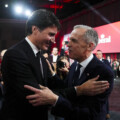Even the beautiful game generates hideous bills.
To understand the lopsided escapade in hosting even a morsel of the early stages of soccer’s World Cup next June and early July for Toronto and Vancouver—and Ontario, British Columbia and all Canadian taxpayers, thanks to Ottawa—it requires an astonishing loss of agency.
But let’s try to unpack it.
Hub AI
Imagine you were a country that wanted to impress the world with your skill at hosting the world’s most-watched sporting event—13 games within them, in two different cities, for more than 650,000 people, mostly from afar. It turns out there is this powerful organization willing to grant you (and, in a strange twist that might diminish the positive effect, a mere 14 other cities at the same time) the privilege of its presence, reinforcing your naïve view of its pitch that these games on the pitch would boost your local economy and global image beyond anything else you could do. You would enter into an agreement that merely works like this: They’d have a blank cheque to define the hosting costs. They’d have the right to upgrade your stadiums to their satisfaction. They’d get all the revenue from tickets, sponsorships, merchandise and broadcasting. They’d have the control to determine the degree, and thus the cost, of security they’d need. They’d have indemnity on any losses or overruns. They’d be exempt from any taxes for these events. For doling out on this, you’d get a small rental fee for the sites and the opportunity to sell some hospitality packages. You’d hope against hope that the broadcast exposure—even though you’re sharing the event with these other cities with the same hope against hope—would bring people to your community in the years to come. To realize that hope, someone would need to be watching TV and say, sight unseen, something to the effect of: “I wonder whether there would be other great reasons to be there today. I think I’ll travel there to find out.” Now, we need to remind your fertile imagination of a few other catches: You’d have to bear any last-minute changes the organizers had in mind, no questions asked. You’d have to close the streets around the sites on the day of and the day after each game—six times in Toronto, seven in Vancouver. You’d have to relinquish the stadiums for about five weeks. In Vancouver, you’d have to cover the playing surface temporarily with natural grass. The teams that typically practice and play on these fields would have to play elsewhere. You’d have to provide free public transit to the hundreds of thousands of ticketholders and reroute traffic near the stadiums on the day before and on the days of the games. You’d have to take down any signage that conflicted with the organization’s sponsors. You’d cleverly rename one playing site (BMO Field) Toronto Stadium. You’d have to ensure that visas for these visitors, players, officials, and fans alike were fast-tracked. You’d have some tickets for local VIPs, but you’d be hosting the games mostly for people from 47 other countries, and most everyone worldwide would win the privilege to attend through local organizations and lotteries. You’d have to build facilities and finance fan festivals for the locals who couldn’t attend these events. There. Deal. The best guess today is that this will be a 10-digit expense with nine-digit losses. The influx of fans for each game—54,500 at B.C. Place, 45,300 at Toronto Stadium—will help hotels, airlines, and restaurants on the eve of the summer peak season. Both cities have local accommodation taxes to mitigate the financial impact, and politicians and tourism officials predict post-event visiting booms—$1 billion in B.C. alone in the five years to follow. This canard is, of course, what it is told, too, by the Fédération Internationale de Football Association, FIFA, the game’s omnipotent global body. There are various levels of governance in the world: local, provincial, federal, maybe the United Nations, then the Vatican, perhaps the International Olympic Committee, and then, in a sphere unto itself, as can be understood by the iron grip it has on the every-four-year event, FIFA. The contracts it has struck for the two Canadian hosts (one took Vancouver journalist Bob Mackin three years to get under freedom-of-information law) are masterclasses in mastering servitude. But projections on sport-related economic benefits are only nominally better than those in horoscopes. Bear in mind, these games are not at one site or in one region; they sprawl across Mexico, the United States, and two Canadian cities, and any focus on any of the 16 hosts will be minimal. Besides, everyone has heard of Canada, and most everyone has heard of Toronto and Vancouver. A two-hour match, usually squeezed into other games that day, is not going to be a tourism showcase unless taxpayers buy in-game advertising. We won’t get the world’s attention, the one thing we crave and will pay fruitlessly to pursue. We could note the latest estimates on the costs (around $1 billion, including Toronto and Vancouver) and the losses (estimated to be at least $250 million), but there are many undisclosed and uncertain expenses to come. Until we know the teams, how they’re grouped (particularly with Canada), and which ones will come here, we don’t know their security requirements, for instance. Canada is not yet a soccer power, even if more children are now enrolled in it than in hockey. We rank 28th, well back of America in 15th and Mexico in 13th. We are fooling ourselves to think we are anything more than an asterisk next year—a win in the three-game preliminary stage would be remarkable for us, a failure for most others. We need to be honest with ourselves—as in, the truth isn’t that taxpayers are providing a blank cheque. One will be written, with several zeroes preceded by some numbers. It’s a great time to do so; it’s not as if we have other needs to attend to, or that we don’t have ample public finances burning a hole in our coffers, just desperate to be spent on some frivolous thing.
Recommended for You

Commentary
Why AI governance needs the moral vocabulary of the oil patch
Nina Rehill-Pattar

Commentary
Don’t downplay the costs of the AI revolution: The Weekly Wrap
Sean Speer

Presented in partnership with Starlight Investments
‘If you build it, they will come’: Why development charges are Canada’s real housing constraint
The Hub Staff

Presented in partnership with Pathways Alliance
‘The most important geopolitical resource we have’: Why the world still needs Canada’s oilsands
The Hub Staff

Analysis
Mark Carney is undoing Justin Trudeau’s legacy: 15 policy reversals from his first year in power
Graeme Gordon



